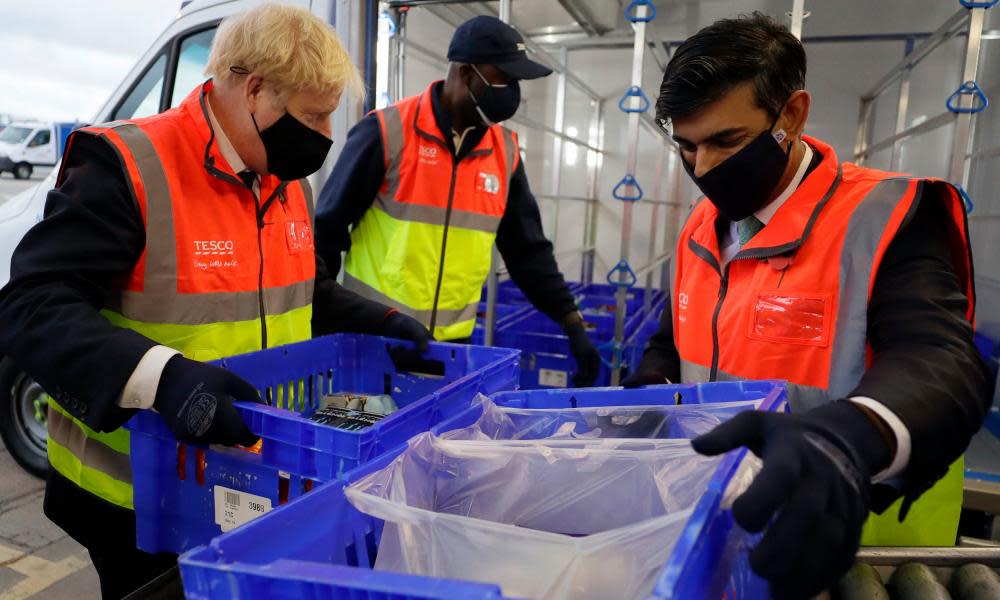It's clearer than ever that Johnson and Sunak are critically unsuited to this moment

What does it take to get Rishi Sunak to act with some urgency? The number of people who have died from Covid-19 has surpassed 100,000, joblessness is on its on its way to reaching 3 million, and thousands of people are slipping from poverty into destitution. The UK’s paltry level of sick pay has forced many to choose between self-isolating and enduring financial hardship, or putting others at risk by going back to work.
But rather than take necessary action, Sunak has strung along those who are already under immense pressure. People claiming universal credit (UC) won’t find out until the March budget whether they will be robbed of their £20 additional weekly payment. Likewise, without giving companies certainty about whether the furlough support will continue, large scale lay-offs will grow to an unstoppable torrent.
We live in hope that the chancellor has learned lessons from his lethal optimism during the summer, when his “eat out to help out” scheme encouraged thousands of people to mix in busy restaurants and contributed to a rise in cases over the autumn and winter. But the truth is that both our prime minister and chancellor are critically unsuited to this moment. They may have got by in better times but not during a crisis like this, when decisive leadership and hard decisions are required.
It’s not like Sunak is ignorant of what lies ahead. He will already have a good idea of the economy’s broad financial parameters over the next year. So there’s no excuse for delay. The chancellor can put people’s minds at rest now by announcing the retention of the UC top-up, bringing forward a real living wage, increasing sick pay, providing greater help to those excluded from the existing package of support measures, and extending the furlough scheme through 2021.
If Sunak is in any doubt about how to pay for these essential measures, he needs look no further than a windfall tax on those who have made huge profits from the pandemic: banks, big tech companies, property developers and the beneficiaries of the recent round of crony government contracts.
Rather than using the March budget for firefighting, the chancellor could then publish what is needed to restore people’s confidence and offer a realistic sense of optimism: a plan for the future, with the biggest job creation scheme since the second world war. Without an ambitious plan on this scale, we risk a K-shaped recovery, in which high earners bounce back from the crisis while millions more are trapped in a life stunted by poverty, insecurity and stress.
There has never been a better time to invest. Sunak is able to borrow at historically low interest rates; as the Office for Budget Responsibility noted in November, the debt interest-to-revenue ratio is at a postwar low. The International Monetary Fund, the Organisation for Economic Co-operation and Development and virtually every serious economist have advised that now is no time for fiscal retrenchment or austerity. The chancellor must avoid repeating the mistakes that followed the 2008 crisis.
Although Sunak may be relying on pent-up demand for consumer goods, leisure and holidays to boost the economy when lockdown ends, consumer spending won’t be enough to provide the well-paid jobs we need. Nor will it stimulate the tax revenues necessary to fund an attack on poverty or pay for crucial investment in public services. The scale of investment we need can only come from the government itself.
If the outsourcing scandals and crony contracts of 2020 have taught us anything, it’s that public ownership and democratic accountability must be put firmly back on the table. The delivery of the vaccine programme is one of the few things going well for the government. That its success is due to the dedication of our NHS workers, in contrast to the failures of the outsourced test-and-trace system, should give us pause for thought.
As Britain recovers from this pandemic, there will be no shortage of work that needs doing. If it wanted to, the government could implement a jobs guarantee for everyone. Aside from the vacancies in the health and social care sectors and the shortage of skilled workers needed to build the homes that will help end the housing crisis, there are huge job creation opportunities to be gained from implementing the green new deal. To transition away from a fossil fuel economy, we’ll need skilled workers to insulate our homes, sink heat pumps, set solar panels, build wind turbines, construct tidal barrages, manufacture batteries, rewild our countryside and deliver publicly-owned broadband connectivity.
Early in the pandemic I argued that ministers had to think big and fast. That’s what we desperately need now from the chancellor. Brinkmanship is no answer to the crisis that Britain faces.
John McDonnell is Labour MP for Hayes and Harlington and the former shadow chancellor

 Yahoo News
Yahoo News 
